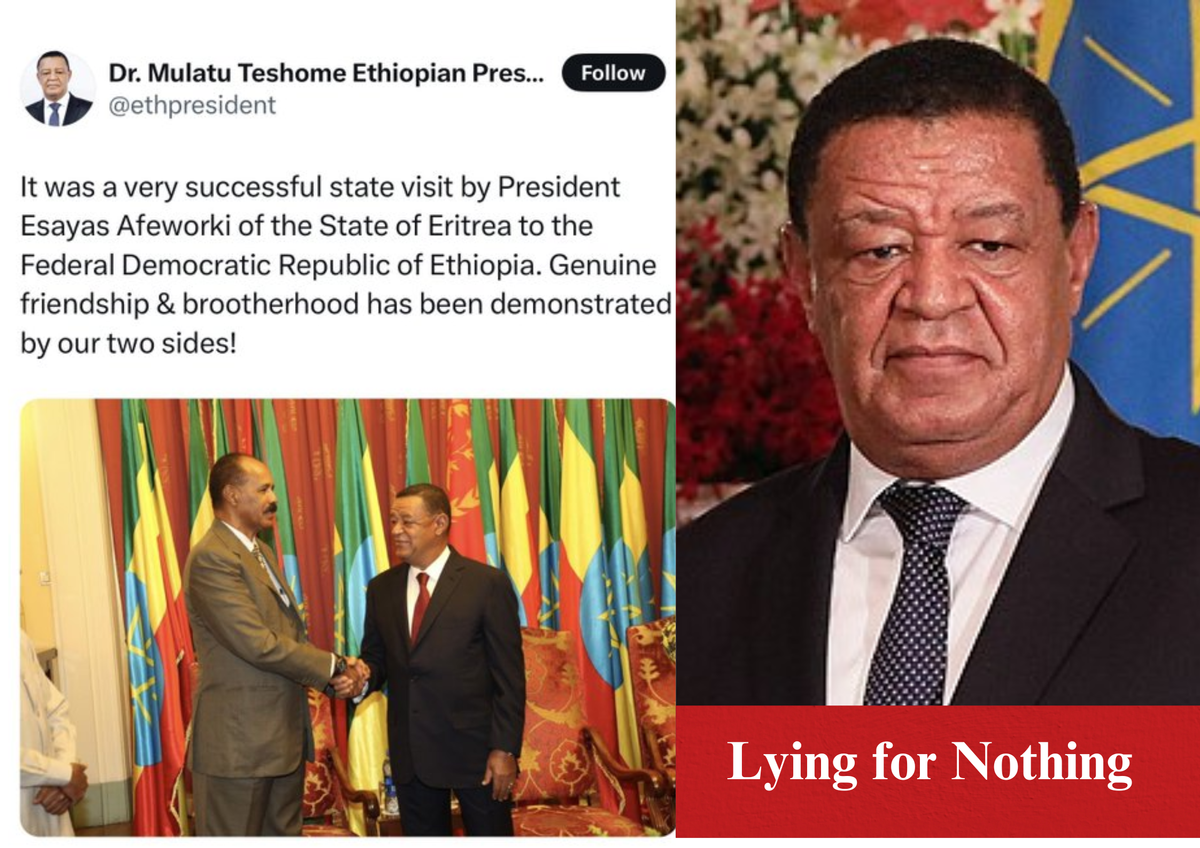Date: Wednesday, 19 February 2025

In classic fashion, Ethiopia’s former figurehead Mulatu Teshome has emerged as a mouthpiece for a well-worn, foreign-sponsored narrative that seeks to externalize Ethiopia’s deepening crisis by scapegoating Eritrea. His sudden alarmist rhetoric is not a call for stability but a calculated ploy to distract from Ethiopia’s rapid unraveling under Abiy Ahmed’s failing leadership and Ethiopia’s history of serving as a vessel for foreign interests.
Ethiopia has never indeed relied on itself. Instead, it has always functioned as a vessel for Western interests, allowing itself to be shaped, manipulated, and dictated to by foreign actors—mainly the United States and its allies. The Pretoria Agreement is a prime example of this dependency. It was neither Ethiopia’s initiative nor a product of African diplomacy. It was crafted, imposed, and enforced by the United States, with no genuine Ethiopian input or willingness to engage in the process. Ethiopia was coerced into signing it under duress, and Eritrea was never involved, nor did it have any interest in obstructing or influencing it.
Abiy Ahmed sought to disarm the Amhara and other allied forces, but his military campaign against them backfired, further fragmenting Ethiopia. He has now lost control over the Amhara region, deepening the country’s internal crisis. Instead of fully implementing the Pretoria Agreement and ensuring the disarmament of the TPLF, he shifted his focus to attacking the Amhara, igniting a direct conflict that has only worsened Ethiopia’s instability.
The Pretoria Agreement was never about lasting peace. It was a calculated move by Washington to weaken Ethiopia by severing Abiy’s ties with Eritrea and dismantling his domestic power base. By isolating Abiy from the Amhara, Afar, and other Ethiopian factions that had fought alongside him against the TPLF, the agreement left Abiy politically vulnerable. He attempted to disarm those who had secured Ethiopia’s survival but failed, leading to direct confrontation and leaving him militarily and politically exposed at a time when he desperately needed stability.
Rather than focusing on stabilizing the country, Ethiopia’s leadership has doubled down on reckless policies that have further alienated it from its neighbors. The government has made provocative and illegal claims over Red Sea ports, openly suggesting that Ethiopia could acquire them “legally if possible, militarily if necessary.” This is not the language of a state seeking peace but the rhetoric of desperation. Additionally, Ethiopia’s secretive deal with Somaliland has created more tensions in the region, while its interference in Sudan has added another layer to the instability.
Internally, Abiy Ahmed’s government has lost control of the country. Ethiopia is no longer a unified state—it is a collection of warring factions, with the federal government’s authority barely extending beyond Addis Ababa. The war in Amhara is another front that exposes the weakness of Ethiopia’s current leadership. Instead of facing these realities, the government is trying to manufacture an external enemy to shift the blame.
One must ask: Why now? Why is Ethiopia suddenly calling on the international community to intervene? The answer is simple. The Ethiopian government is begging the new U.S. administration to continue the failed regime-change policies of the past. The previous U.S. administration’s interventionist approach failed, and now Ethiopia’s leaders are scrambling to keep that same misguided policy alive.
With USAID scaling back operations and Washington reassessing its priorities, Ethiopia’s government fears losing its Western patronage. Instead of adapting, it is clinging to outdated strategies—reviving the same anti-Eritrean propaganda used for decades. Ethiopia’s ruling elite is playing a familiar game: sell out their neighbors to Western powers, suppress internal dissent, and deflect responsibility for their failures.
Ethiopia’s leadership, not Eritrea, is the biggest threat to the region’s stability. The government has isolated itself through reckless policies, alienated its people, and now finds itself on the verge of collapse. Mulatu Teshome’s sudden outcry against Eritrea is not about preserving peace—it is about securing foreign intervention to prop up a failing regime.
During Mulatu’s tenure (2013–2018), Ethiopia was already on the verge of collapse. Eritrea’s comprehensive support and the Trump administration’s shift in policy prevented Ethiopia’s complete disintegration. When Abiy Ahmed rose to power, it was Eritrea’s peace initiative and Eritrea’s crucial role in defeating the TPLF that allowed Ethiopia to survive. Without Eritrea’s military and strategic support, Ethiopia would have been torn apart long before now.
Now, as Ethiopia once again faces collapse, the real question is whether Eritrea will ever step in to save an Ethiopian regime again. Abiy has squandered every advantage given to him. His leadership has left Ethiopia fractured, isolated, and weakened. Unlike before, there is no guarantee that Eritrea—or anyone else—will intervene to pull Ethiopia back from the abyss.
Scapegoating Eritrea will not save Ethiopia from itself. The true cause of Ethiopia’s instability is its own leadership’s betrayal of its people, its servitude to foreign interests, and its refusal to take responsibility for its crises. Ethiopia appears doomed.